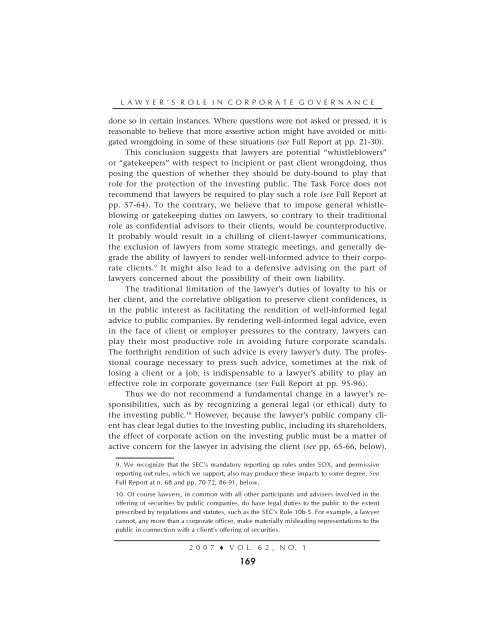2007 Issue 1 - New York City Bar Association
2007 Issue 1 - New York City Bar Association
2007 Issue 1 - New York City Bar Association
Create successful ePaper yourself
Turn your PDF publications into a flip-book with our unique Google optimized e-Paper software.
L A W Y E R ’ S R O L E I N C O R P O R A T E G O V E R N A N C E<br />
done so in certain instances. Where questions were not asked or pressed, it is<br />
reasonable to believe that more assertive action might have avoided or mitigated<br />
wrongdoing in some of these situations (see Full Report at pp. 21-30).<br />
This conclusion suggests that lawyers are potential “whistleblowers”<br />
or “gatekeepers” with respect to incipient or past client wrongdoing, thus<br />
posing the question of whether they should be duty-bound to play that<br />
role for the protection of the investing public. The Task Force does not<br />
recommend that lawyers be required to play such a role (see Full Report at<br />
pp. 57-64). To the contrary, we believe that to impose general whistleblowing<br />
or gatekeeping duties on lawyers, so contrary to their traditional<br />
role as confidential advisors to their clients, would be counterproductive.<br />
It probably would result in a chilling of client-lawyer communications,<br />
the exclusion of lawyers from some strategic meetings, and generally degrade<br />
the ability of lawyers to render well-informed advice to their corporate<br />
clients. 9 It might also lead to a defensive advising on the part of<br />
lawyers concerned about the possibility of their own liability.<br />
The traditional limitation of the lawyer’s duties of loyalty to his or<br />
her client, and the correlative obligation to preserve client confidences, is<br />
in the public interest as facilitating the rendition of well-informed legal<br />
advice to public companies. By rendering well-informed legal advice, even<br />
in the face of client or employer pressures to the contrary, lawyers can<br />
play their most productive role in avoiding future corporate scandals.<br />
The forthright rendition of such advice is every lawyer’s duty. The professional<br />
courage necessary to press such advice, sometimes at the risk of<br />
losing a client or a job, is indispensable to a lawyer’s ability to play an<br />
effective role in corporate governance (see Full Report at pp. 95-96).<br />
Thus we do not recommend a fundamental change in a lawyer’s responsibilities,<br />
such as by recognizing a general legal (or ethical) duty to<br />
the investing public. 10 However, because the lawyer’s public company client<br />
has clear legal duties to the investing public, including its shareholders,<br />
the effect of corporate action on the investing public must be a matter of<br />
active concern for the lawyer in advising the client (see pp. 65-66, below).<br />
9. We recognize that the SEC’s mandatory reporting up rules under SOX, and permissive<br />
reporting out rules, which we support, also may produce these impacts to some degree. See<br />
Full Report at n. 68 and pp. 70-72, 86-91, below.<br />
10. Of course lawyers, in common with all other participants and advisers involved in the<br />
offering of securities by public companies, do have legal duties to the public to the extent<br />
prescribed by regulations and statutes, such as the SEC’s Rule 10b-5. For example, a lawyer<br />
cannot, any more than a corporate officer, make materially misleading representations to the<br />
public in connection with a client’s offering of securities.<br />
2 0 0 7 V O L. 6 2 , N O. 1<br />
169

















